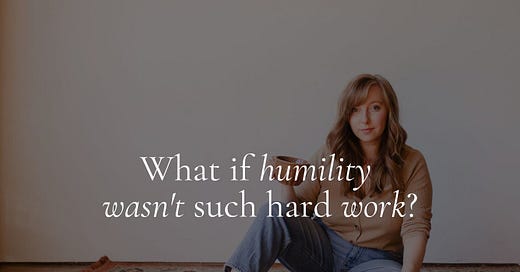What if humility wasn't such hard work?
Screwtape's 14th Letter reveals freedom in unexpected places.
I’m gonna be honest: I sort of loathe the “More of God, less of me” phrase that’s toted around in certain Christian circles. Not because the sentiment is at all bad. In fact, it’s a guiding principle in my own life. I really do think we’re better off when there’s “more of God and less of us” in any situation.
So why do I hate it?
Mainly because we hear it, or even use it, without truly knowing what it means. The surface-level implication of saying “He must become more and I must become less” (another variation of the same phrase) to a Biblically illiterate (or simply new) Christian can result in said Christian believing that everything which makes up who they are simply… doesn’t matter. Their feelings, their body, their hopes and dreams: all of those must “decrease” (read: “be disregarded”) so that He can increase.
And on the one hand, yes. It’s true. Our natural state of being has to be entirely humbled to make space for the Holy Spirit at work in our lives. Sin robs us of so much. We have to die to self, laying everything at the foot of the cross in exchange for a new, Heaven-made way of being. I don’t think I’ve ever witnessed anything more beautiful than the Episcopalian Priests who literally lay prostrate at the foot of the cross at the Good Friday service I attended in Edinburgh.
But on the other hand… no. God is not asking you to inherently discard everything that makes you who you are. He made you who you are. Your gifts, body, mind, and dreams were all hand-crafted by the Maker of all things. Has sin corrupted us? Yes. Does He want to correct (read, “redeem”) us from this corruption? Yes. We must decrease so that He can increase; but as He increases, we actually become more ourselves than ever before. It’s a weird both/and situation that only makes sense with a God as big and mysterious as ours. And without dwelling in the uncomfortable both/and mystery, we lose sight of what a stunning invitation it is that we decrease – because, quite frankly, we don’t understand how glorious, beautiful, good, and freeing it is for Him to increase.
The enemy wants to bring the man to a state of mind in which he could design the best cathedral in the world, and know it to be the best, and rejoice in the fact, without being any more (or less) or otherwise glad at having done it than he would be if it had been done by another. The enemy wants him, in the end, to be so free from any bias in his own favor that he can rejoice in his own talents as frankly and gratefully as in his neighbor’s talents — or in a sunrise, an elephant, or a waterfall. He wants each man, in the long run, to be able to recognize all creatures (even himself) as glorious and excellent things.
- C.S. Lewis, The Screwtape Letters, Letter 14
In this week’s episode of Magic Like This, we look at Letter 14 of Screwtape Letters, where Screwtape maps out a detailed counterattack to the raw, honest humility that is brewing within the Patient. And as usual, Lewis draws our attention to the fact that true humility, rather than being burdensome and stuffy, is beautifully freeing. It is only false humility, rooted in lies and pride, which place us in bondage.
When we are artificially humble, we attempt to convince ourselves and everyone around us that we are ugly, stupid, common, average – even when none of those things are true. We get caught in this cyclone of self-obsession as we attempt to convince ourselves of the impossible: that a lie we’ve fabricated is somehow real. This is not humility at all. In fact, it requires us to be hyper-focused on ourselves and our own image in a way which just feels… gross. And sad. And just. not. true.
True humility, on the other hand, actually allows us to claim as fact the honest, beautiful gifts that God has woven into each of us as individuals, and in acknowledging said truths, we are invited to “forget ourselves” in exchange for awe-filled worship of the God who crafted us. As our view of Him increases, we decrease, but we actually become more ourselves than ever (because we were literally made to love the Lord our God and worship Him forever – there is no stance more categorically natural to us than this).
Humility is bred from seeing the world (and ourselves as part of that world) in its proper place as evidence of a wonderfully good, creative God who actually loves us – a God whose goodness is so pure and wonderful and lovely that to be totally consumed by Him is entirely more magical than to be consumed by us.
To be humble is to rest in the beautiful knowledge that we are “glorious and excellent things” for no other reason than God has made us so, and what a gift. What a freeing opportunity to think of ourselves less so that we may enjoy ourselves more.
I can’t think of anything more repugnant to a jealous and prideful enemy than that.
All my love,
Listen to this week’s episode:
Book Club Discussion Questions:
Have you ever found yourself manufacturing a false humility by claiming that you’re not good at things that you actually are good at? What might happen for you if you reframed the conversation and embraced your gifts as evidence of your very good God?
Is there anyone in your life who strikes you as sincerely humble? What are your favourite things about that person?
What’s your favourite line from Screwtape’s 14th Letter? What about it spoke to you?
Links and episode mentions:
The Screwtape Letters by C.S. Lewis
The Weight of Glory by C.S. Lewis
My essay on jealousy: Dear jealous creative, what if this was the answer all along?
Beauty is NOT “in the eye of the beholder.” C.S. Lewis on Beauty. by Isaac Angel Meza
Gentle and Lowly by Dane Ortlund
How to become a paid subscriber:
Join the Book Club for £5 a month to get the extended, 1-hour version of each podcast episode (and join Book Club discussions) by clicking below:
Or, if you'd like access to the extended Magic Like This episodes AND my exclusive podcast, The Waffler, you can become a paid subscriber of my primary Substack, The Battle Cry, and I will comp you a paid Magic Like This subscription as well for one year. You can become a paid subscriber for £8 a month by clicking below. (NOTE: due to GDPR laws, you’ll need to message me to let me know that you would like to claim your comped Magic Like This subscription once you’ve subscribed to The Battle Cry).
For fellow writers:
Pick Up Your Sword, my writing course for aspiring Christian authors re-launches on May 30th. Be the first to access it when the cart opens and save £150 by joining the waitlist:
Join The Writer’s List to get writing tips rooted in Scripture and exclusive updates when I launch new writing resources.






